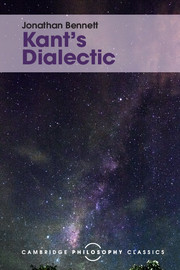Book contents
- Frontmatter
- Contents
- Preface to this edition by Karl Ameriks
- Preface
- System of references
- 1 Introduction
- 2 Concepts and intuitions
- 3 Substances and reality
- 4 The substantiality of the soul
- 5 The simplicity of the soul
- 6 The identity of the soul
- 7 Infinity
- 8 Limits
- 9 Divisibility
- 10 Freedom
- 11 God
- 12 Reason
- Index
4 - The substantiality of the soul
Published online by Cambridge University Press: 05 July 2016
- Frontmatter
- Contents
- Preface to this edition by Karl Ameriks
- Preface
- System of references
- 1 Introduction
- 2 Concepts and intuitions
- 3 Substances and reality
- 4 The substantiality of the soul
- 5 The simplicity of the soul
- 6 The identity of the soul
- 7 Infinity
- 8 Limits
- 9 Divisibility
- 10 Freedom
- 11 God
- 12 Reason
- Index
Summary
The Cartesian basis
We now start on the Dialectic, beginning with Book II (see §1 above). The first chapter of this, to which my next three chapters will be devoted, is called ‘The Paralogisms of Pure Reason’. Its topic is the soul – i.e. one's mind when considered independently of any beliefs about anything else whatsoever. In this use of ‘soul’, the word has no religious connotations.
I shall use the phrase ‘the Cartesian basis’ to refer to the intellectual situation in which one attends to nothing but one's mind and its states. Descartes worked his way down to the Cartesian basis by ‘feigning doubt’ of everything which did not meet a certain standard of indubitability. That left him with an indubitable residue which he embodied in the statement ‘Cogito’, which I take to stand for any first-person, present-tense statement about one's own mind. Descartes’ standard of indubitability is unattractive, his reason for interest in it is even more so, and his reconstruction on the basis of ‘Cogito’ is lax and self-indulgent. What makes his endeavour still interesting is its representing one's knowledge of one's own states of mind as the foundation for all one's other knowledge. Even if I cannot doubt that I have a body while not doubting that my mind is thus and so, still all my beliefs about bodies somehow rest on what I know about states of my mind. So I am sympathetic to the adoption of the Cartesian basis, i.e. to the position sometimes called ‘methodological solipsism’.
The following evident truths, I submit, show that the Cartesian basis is basic:
(1) Any intellectual problem which I have must, for me, take the form ‘What should I think about x?’
(2) The decision as to what I am to think about x must be taken by me.
(3) My decision as to what to think about x must be based upon data which I have.
(4) How I use my data in reaching my decision must depend upon the concepts, or the intellectual capacities and dispositions, which I have.
These are almost trivial, and yet taken together they imply that the Cartesian basis is the foundation of all knowledge.
- Type
- Chapter
- Information
- Kant's Dialectic , pp. 66 - 81Publisher: Cambridge University PressPrint publication year: 2016

